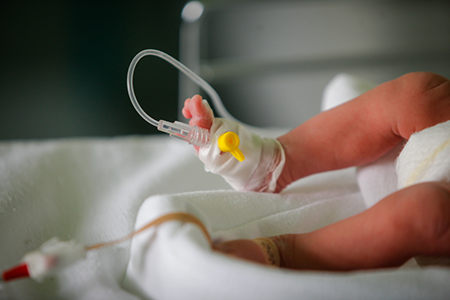 In 2019, one in 10 babies was born too early in the United States. Learn about the problem, risk factors, and what we can do to reduce premature birth.
In 2019, one in 10 babies was born too early in the United States. Learn about the problem, risk factors, and what we can do to reduce premature birth.
About premature birth
A developing baby goes through important growth throughout pregnancy - including in the final months and weeks. Premature (also known as preterm) birth is when a baby is born too early, before 37 weeks of pregnancy have been completed. The earlier a baby is born, the higher the risk of death or serious disability. In 2018, preterm birth and low birth weight accounted for about 17% of infant deaths. Babies who survive can have breathing issues, intestinal (digestive) problems, and bleeding in their brains. Long-term problems may include developmental delay (not meeting the developmental milestones for his or her age) and lower performance in school.
Preterm birth in the United States
Reducing preterm birth in a national public health priority. Preterm birth rates decreased from 2007 to 2014, and CDC research shows the decline in preterm births is partly due to fewer teens and young women giving birth. Despite this success, the preterm birth rate rose for the fifth year in a row in 2019, and one in 10 babies (10%) was born too early in the United States. Additionally, racial and ethnic differences in preterm birth rates remain. For example, in 2019, the rate of preterm birth among non-Hispanic black women (14.4%) was about 50% higher than the rate of preterm birth among non-Hispanic white women (9.3%) or Hispanic women (10%).
Risk factors
Experts don't know all the reasons that some babies are born too early. Some things (called risk factors) can increase the chance that a woman will have a preterm birth. However, a woman can still have a premature birth even if she has no known risk factors. Some risk factors for preterm birth include delivering a premature baby in the past, being pregnant with multiples, tobacco use and substance abuse, and short time (less than 18 months) between pregnancies. Additionally, pregnancy complications can result in preterm birth because the baby has to be delivered early.
Signs and symptoms of preterm labor
In most cases, preterm labor (labor that happens too soon, before 37 weeks of pregnancy) begins unexpectedly and the cause is unknown. Like regular labor, signs of early labor include:
- Contractions (the abdomen tightens like a fist) every 10 minutes or more often
- Change in vaginal discharge (a significant increase in the amount of discharge or leaking fluid or bleeding from the vagina)
- Pelvic pressure - the feeling that the baby is pushing down
- Low, dull backache
- Abdominal cramps with or without diarrhea
If you have any signs or symptoms of preterm labor, call your healthcare provider right away.
What can we do?
We can work to reduce preterm birth using the following strategies:
- Providing women access to health care before and between pregnancies
- Identifying woman at risk for preterm delivery and offering effective treatments to prevent preterm birth
- Preventing unintended pregnancies and waiting at least 18 months between pregnancies
- Choosing single embryo transfer as appropriate when undergoing in vitro fertilization because being pregnant with multiples (twins, triplets, or more) has a higher risk of preterm birth
